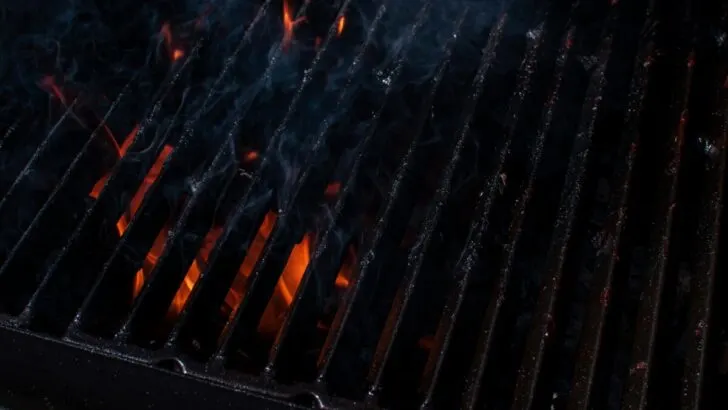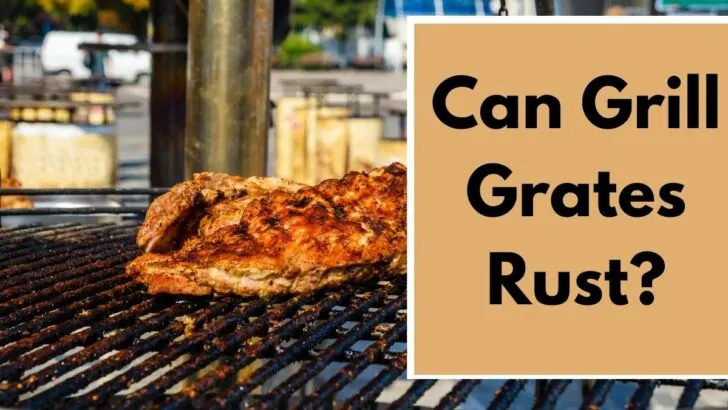If you just bought stainless steel or cast iron grill grates and are wondering how rust-proof they are, then we have got you covered.
To answer it simply, no matter what your grill grates are made of, whether stainless steel or a metal with finishing, grills are prone to rust, especially if they’re not properly maintained.
There are several causes for this, but at the same time, you can prevent rusting with a few simple steps as well. Let’s look at all of these points in detail.
What Causes Grill Grates To Rust?
To understand the cause, we need to look at the basics of rusting. Iron oxide, commonly known as rust, forms when the metal iron is exposed to oxygen.
A chemical reaction called oxidation occurs between these two elements. This is why many cast-iron grill grates are always coated in finishing or should be regularly seasoned. When this finishing is corroded, rust starts to appear at a rapid pace.

Stainless steel on the other hand is an alloy-a mixture of iron and other metals- one of which is Chromium.
It is when this metal is exposed to oxygen, that an invisible layer of Chromium oxide forms which keeps iron and oxygen from reacting to form rust. If it gets corroded stainless steel does rust too albeit at a shorter pace.
In short, whether you have a metal or stainless steel grill grate, rust is caused when these metals’ protective coating is corroded exposing the metal iron to oxygen.
And this normally occurs when the grill grates are exposed to chemical or mechanical abrasion, like harsh cleaners and cleaning tools or even high humidity and extremely saline environments. Food grease and remains too can cause rust to form.
How To Prevent Rust From Forming On Grill Grates?
Now that you understand the science and causes of rusting, let’s look at ways to prevent them from forming.
Stay Clear of Liquids
Sauce and marinating liquids are excellent when it comes to BBQ food. However, try applying them to your food beforehand in a dish and not by directly pouring while your food is searing on the grill. If you do still do so, make sure to clean thoroughly after without using abrasive methods.
Clean Your Grill After Every Use
As mentioned above, grease and any remnants of meat causes the protective layer to oxidize, so it’s best to start cleaning after every time you grill. To prevent any wire bristles from falling loose and adhering to your grates, you might also want to think about cleaning with a grill brush without bristles. Furthermore, in the case of charcoal grills, they are best cleaned when hot with a dash of water and a brush.
Oil Your Grill
Remember it is not “greasing” your grill, but oiling them. Both your gas and charcoal grills should be oiled with a thin coating of vegetable oil after each cleaning session. This not only ensures that your food doesn’t stick to the grill grates but also keeps moisture at bay which in turn prevents rust from forming.
Deep Clean Occasionally
while after each use cleaning is important, an occasional deep clean is also a good idea. To do so, simply soak your grate in a solution of hot water, dish soap and baking soda. Then gently scrub off the grate with a brush and afterwards wipe the grates with a clean cloth.
Keep Your Grill in a Cool, Dry Place
The main cause of rusting and shortening the life of your grill is moisture. Use a form-fitting vinyl or nylon covering( with cloth interior) to cover your grills during non-BBQ seasons and move them to a shed or garage if possible. Do this especially if your environments tend to be high in humidity. If you are blessed enough to live near sea waters, then take extra precautions to protect and clean your grill because the high levels of salt in the environment might damage it.
Final Words on Grill Grates Rusting
Knowing that even stainless steel grates aren’t safe from rust can be disappointing, to say the least. However, rusting of stainless steel grates doesn’t happen as quickly or as bad as that of iron grates.
Nonetheless, no matter what your grill grates are made of, taking care of them is important. Tackling the issue of rust by knowing its root cause and early prevention is the key to keeping your grill grates as good as new!


